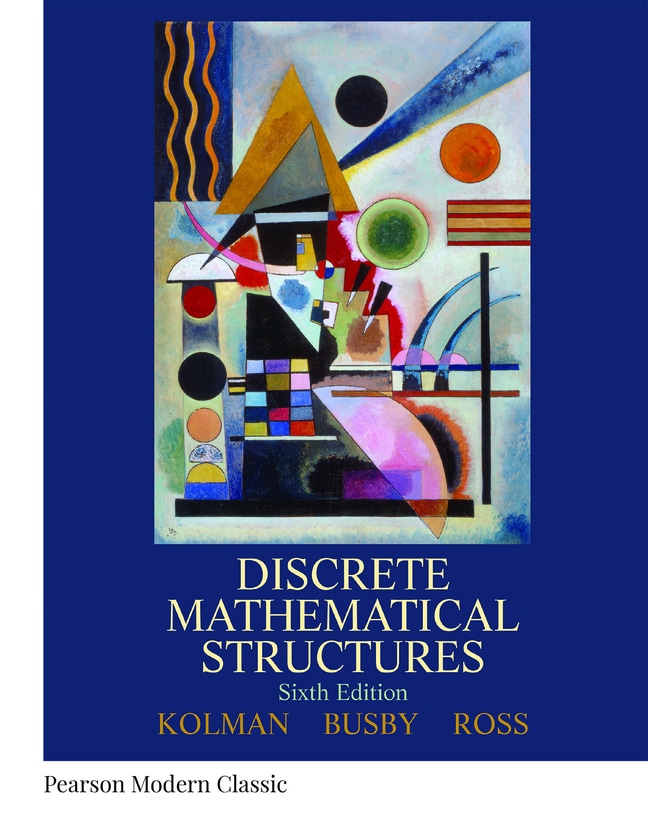
Discrete Mathematical Structures (Classic Version), 6th edition
- Bernard Kolman
- , Robert Busby
- , Sharon C. Ross

- Find it fast
Quickly navigate your eTextbook with search
- Stay organized
Access all your eTextbooks in one place
- Easily continue access
Keep learning with auto-renew
A modern classic
Discrete Mathematical Structures, 6th Edition offers a clear and concise presentation of the fundamental concepts of discrete mathematics. Ideal for a one-semester introductory course, this text contains more genuine computer science applications than any other text in the field. It is written at an appropriate level for a wide variety of majors and non-majors, and assumes a college algebra course as a prerequisite.
This title is part of the Pearson Modern Classics series. Pearson Modern Classics are acclaimed titles at a value price.
Published by Pearson (July 14th 2021) - Copyright © 2022
ISBN-13: 9780137538782
Subject: Advanced Math
Category: Discrete Math
Table of Contents
- Fundamentals
- 1.1 Sets and Subsets
- 1.2 Operations on Sets
- 1.3 Sequences
- 1.4 Properties of Integers
- 1.5 Matrices
- 1.6 Mathematical Structures
- Logic
- 2.1 Propositions and Logical Operations
- 2.2 Conditional Statements
- 2.3 Methods of Proof
- 2.4 Mathematical Induction
- 2.5 Mathematical Statements
- 2.6 Logic and Problem Solving
- Counting
- 3.1 Permutations
- 3.2 Combinations
- 3.3 Pigeonhole Principle
- 3.4 Elements of Probability
- 3.5 Recurrence Relations 112
- Relations and Digraphs
- 4.1 Product Sets and Partitions
- 4.2 Relations and Digraphs
- 4.3 Paths in Relations and Digraphs
- 4.4 Properties of Relations
- 4.5 Equivalence Relations
- 4.6 Data Structures for Relations and Digraphs
- 4.7 Operations on Relations
- 4.8 Transitive Closure and Warshall’s Algorithm
- Functions
- 5.1 Functions
- 5.2 Functions for Computer Science
- 5.3 Growth of Functions
- 5.4 Permutation Functions
- Order Relations and Structures
- 6.1 Partially Ordered Sets
- 6.2 Extremal Elements of Partially Ordered Sets
- 6.3 Lattices
- 6.4 Finite Boolean Algebras
- 6.5 Functions on Boolean Algebras
- 6.6 Circuit Design
- Trees
- 7.1 Trees
- 7.2 Labeled Trees
- 7.3 Tree Searching
- 7.4 Undirected Trees
- 7.5 Minimal Spanning Trees
- Topics in Graph Theory
- 8.1 Graphs
- 8.2 Euler Paths and Circuits
- 8.3 Hamiltonian Paths and Circuits
- 8.4 Transport Networks
- 8.5 Matching Problems
- 8.6 Coloring Graphs
- Semigroups and Groups
- 9.1 Binary Operations Revisited
- 9.2 Semigroups
- 9.3 Products and Quotients of Semigroups
- 9.4 Groups
- 9.5 Products and Quotients of Groups
- 9.6 Other Mathematical Structures
- Languages and Finite-State Machines
- 10.1 Languages
- 10.2 Representations of Special Grammars and Languages
- 10.3 Finite-State Machines
- 10.4 Monoids, Machines, and Languages
- 10.5 Machines and Regular Languages
- 10.6 Simplification of Machines
- Groups and Coding
- 11.1 Coding of Binary Information and Error Detection
- 11.2 Decoding and Error Correction
- 11.3 Public Key Cryptology